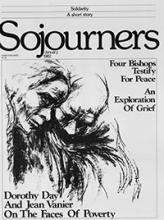In November of 1981 the bishops of the U.S. Catholic Church held their annual meeting in Washington, D. C. In his opening address, Archbishop John Roach, president of the National Conference of Catholic Bishops, called the bishops to leadership in efforts to stop the arms race, ban abortion, and advocate for the poor.
"On a global scale, the most dangerous moral issue in the public order today is the nuclear arms race.... The church needs to say 'no' clearly and decisively to the use of nuclear arms," he said.
Later Archbishop Joseph Bernadin, chairman of the Bishops' Committee on War and Peace, gave a report on the group's work that carefully reiterated the church's historical teachings on war and its growing concern over nuclear war.
Among the 270 prelates making up the conference were Bishops Thomas Gumbleton of Detroit, Raymond Hunthausen of Seattle, Leroy Matthiesen of Amarillo, Texas, and Walter Sullivan of Richmond, Virginia. Each had made statements and taken actions that placed them clearly against the nation's policies concerning nuclear weapons.
In June, 1981, Hunthausen asked the Catholics of Seattle to think about refusing to pay half their income tax in protest of the amount of revenue spent on nuclear arms. Later that summer Matthiesen asked workers at an Amarillo nuclear munitions plant to consider finding other work.
While in town for the conference, these four bishops spent an evening talking to a crowded assembly hall at Catholic University where they responded to questions about their positions, faith journeys, and hopes for the church. Later that night, three of them were interviewed for Sojourners by Jim Wallis. Following is an edited transcript of their statements and the subsequent interview ("The Issue At Home"). --The Editors
Read the Full Article

